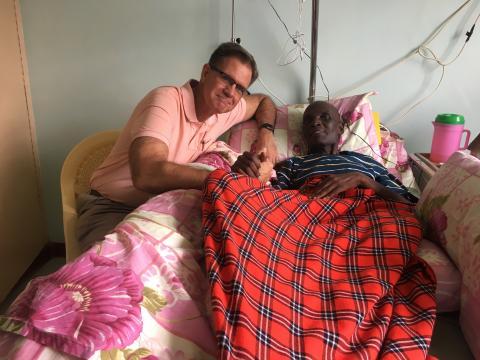
Maryknoll Fr. Rick Bauer in Kenya shares this message from the Interfaith Health Platform. This article was published in the January-February 2021 issue of NewsNotes.
World AIDS Day is commemorated on the 1st of December each year as a time to honor the memory of the people we have lost, give thanks for the progress we have made and commit ourselves anew to ensuring that no one is left behind.The 2020 theme selected by UNAIDS, “global solidarity, shared responsibility,” embraces a renewed consciousness and commitment in promoting the right to health of all, and it recognizes the multi-dimensional aspects of global health while underscoring that “no one country can do it alone.”
In 2020, the world’s attention has been on the COVID-19 pandemic and on how pandemics affect lives and livelihoods. Yet, HIV is not over. 38 million people globally are living with HIV. Every day, men, women and children become infected with HIV and many still lack access to quality treatment.
The UN agency UNAIDS warns that the pandemic has pushed the world’s AIDS response even further off track, and that 2020 targets are being missed. It urges countries to learn from the lessons of underinvesting in healthcare and to step up global action to end AIDS and other global health emergencies.
Citing new data showing the pandemic’s long-term impact on global HIV response, UNAIDS says that there could be up to nearly 300,000 additional new HIV infections between now and 2022, and up to 148,000 more AIDS-related deaths.
COVID-19 and HIV show that health is interlinked with other issues, such as reducing inequalities; promoting human rights, social protection and justice; and ensuring economic growth and equity in distribution of health resources. COVID-19 has also been a wake-up call: an opportunity to do things differently, better, and together.
In a new report, “Prevailing against pandemics by putting people at the centre,” UNAIDS is calling on countries to make far greater investments in global pandemic responses and adopt a new set of bold, ambitious but achievable HIV targets. Joint efforts and actions by faith leaders, groups and communities are needed to contribute to reaching these bold targets. Indeed, religious and spiritual leaders can be a strong voice in favor of supportive legal, regulatory and social environments that advance human rights, gender equality, social justice goals, and call for successful strategies for HIV prevention, testing, treatment, care and support.
Faith in Action: Endorse the 13 Million Campaign, a global interfaith campaign to promote access to health services to the million of children, women and men living with HIV who are not yet on antiretroviral treatment: http://bit.ly/13MilAids
Photo courtesy of Fr. Rick Bauer, MM.
